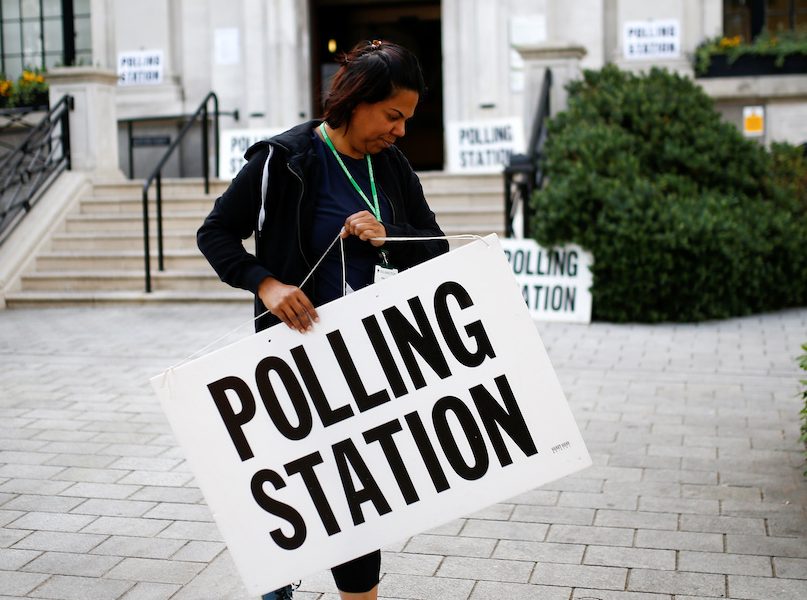- Voters across Europe are taking part in the European Parliament elections.
- The UK is also taking party after prime minister Theresa May delayed Brexit by six months.
- However, hundreds of EU citizens living in the UK have reported being turned away from polling stations.
- The hashtag #deniedmyvote is trending on social media as voters report being disbarred from taking part.
LONDON – EU citizens living in the UK claim they have been turned away from polling stations in the European elections.
Campaigners representing EU citizens said many Europeans living in the UK had not been sent the correct forms in time, meaning they were subsequently disbarred from voting.
The hashtag #deniedmyvote has been trending on Twitter since Thursday morning, with hundreds of EU citizens claiming they have been denied a chance to vote.
Immigration and human rights barrister Agata Patyna reported that she had been turned away from a polling station on Thursday.
She tweeted: "Turned away from polling station this morning. Told I should vote in my EU member state. Called local council yesterday, they confirmed I could vote. Called again today. Apparently council had no time to send out forms to all EU residents. Nothing they can do now."
She added: "To clarify, I registered before the deadline. Have been here since 2005. Voted many times before. This is 'my' EU member state."
Nina Lindholm, a Masters graduate living in Cardiff who is originally from Finland, was also unable to vote.
She told Business Insider: "I gave my name and address at the station, but my name was crossed out and I was told I wasn't eligible to vote.
"I feel it was important to vote in this election as an EU national in the UK since I didn't have any say in the EU referendum.
"This is the one election where I could try to make my voice heard. I'm privileged to have the right to vote and I'm frustrated not to have been able to do so today."
Lina Dencik, a reader at Cardiff University, also said that she had been denied the chance to vote. "Early morning visit to cast my vote only to have it disenfranchised because my declaration that I wouldn't be voting in Sweden (my country of citizenship) hadn't been processed in time," she tweeted.
A spokesperson for the Electoral Commission said: "The very short notice from the government of the UK's participation in these elections impacted on the time available for awareness of this process amongst citizens, and for citizens to complete the process."
Nicolas Hatton, a spokesman for the3million, an EU citizens' rights group, told Business Insider: "Today, we are seeing hundreds of EU citizens turned away from the polling booths.
"It is outrageous that the incompetence and unwillingness of the government and the Electoral Commission have denied these people a vote."
He said the3million would be pushing for an investigation into a "democractic disaster" which had "disenfranchised many of the European citizens most affected by the outcome of these elections."
David Lammy, the Labour MP for Tottenham North, tweeted: "3 years of being insulted, exploited and asked to apply to stay in their own homes. Now reports flooding in that EU citizens are being turned away at polling stations, despite being registered to vote. The two step process is ugly discrimination."
An Electoral Commission spokesperson said: "We understand the frustration of some citizens of other EU Member States, resident in the UK, who have been finding they are unable to vote today when they wish to do so.
"All eligible EU citizens have the right to vote in the EU elections in their home Member State. If an EU citizen instead chooses to vote in the EU election in the UK, there is a process for them to complete to essentially transfer their right to vote, from their home Member State to the UK. This is a requirement of EU law, which specifies that this has to be done "sufficiently in advance of polling day". UK law sets this as 12 working days in advance of the poll.
"This legal process could be made easier for citizens, and the Commission made the case for doing so following the last EU elections in 2014. However, improvements to the process are reliant on changes to electoral law, which can only be taken forward by Government and Parliament.
"The very short notice from the government of the UK's participation in these elections impacted on the time available for awareness of this process amongst citizens, and for citizens to complete the process. EU citizens' right to vote in the election in their home Member State remains unaffected by the change in the UK's participation; in order to do so, they would need to be registered in that country in accordance with that country's process and timetable."

